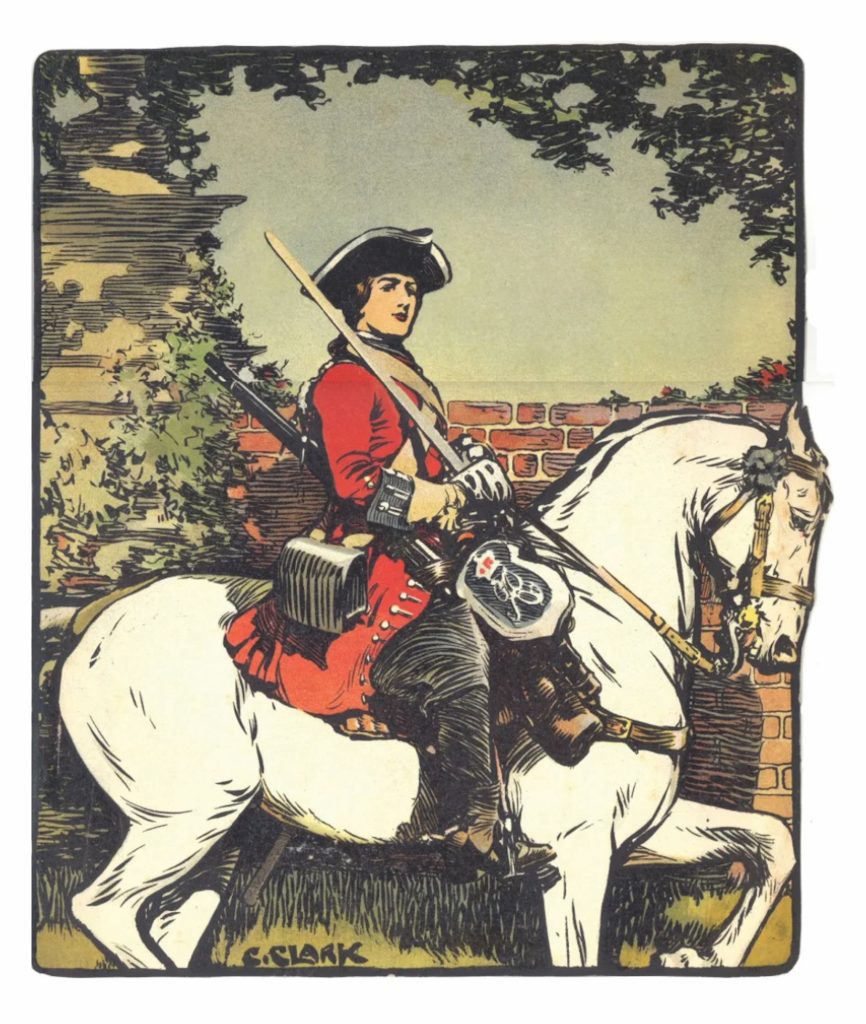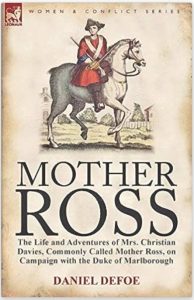How the search for her missing husband turned this Irish wife and mother into a daring and dauntless soldier.
She was born Christian Cavanagh in 1667, although throughout her life, she changed names and identities with particular zest. Known mostly as Kit Cavanagh or Christopher Welsh, she dabbled in surnames that included Welch, Welsh, Jones, Davies, and oddly, Mother Ross.
Kit was the daughter of a soldier in the Jacobite army who died at the Battle of Aughrim, the bloodiest battle ever fought on Irish soil. The previous year, the Catholic King James II lost the Battle of the Boyne and Aughrim, the final defeat for the Catholic cause in Ireland. It was also a devastating blow for the Cavanagh family, who had their lands confiscated and were forced to live with an aunt who owned a pub in Dublin.
Kit was something of a wild teen but at the aunt’s pub, she worked hard and was known, in her words, “for my gaiety of temper.” She married a pub employee, Richard Welch, and, in short order, the couple had two children. One morning, pregnant with her third child, Kit woke up and found her husband had just vanished. A year had passed when she finally received a letter from the missing mate using a timeworn excuse: he was in a Dublin tavern and had “a spot taken.” The next day, a sober Richard realized he was in Holland but couldn’t remember how he got there. It got worse: “I was in the British Army,” he lamented, “forced to fight for “King Billy!” (He was referring to the loathed King William III.)
Kit acted fast. She cut her hair, left her children with her mother, took a suit of her husband’s and a new name, Christopher Welch. The recruiting officer in Dublin called her “a clever, brisk young fellow,” and she was off to Holland. She enlisted in the Duke of Marlborough’s foot regiment as a dragoon to fight in the Nine Years War between Britain/Holland against France. She was wounded in the 1693 Battle of Landen, captured by the French, and returned to the British in a prisoner exchange. Kit’s fellow soldiers, admiring of her fighting spirit and courage, had no clue about her true gender even though “she ate with them, drank with them, slept with them, played cards with them, even urinated alongside them by using what she describes as a ‘silver tube with leather straps.’”
She was a perfect gentleman, too: when she witnessed an officer impugning a young girl’s honor, Kit rushed to her defense. The officer challenged her to a duel, and with shades of Lochinvar, Kit won.
“So daring in love and so dauntless in war/ Have ye e’er heard of gallant like young Lochinvar.”
So overwhelmed by this act of chivalry, the young girl wanted them to marry, but Kit demurred although she continued to be a (lady) Ladies Man. When a pregnant prostitute insisted Kit was the father of her baby, the mother of three happily volunteered to pay the prostitute child support.
After the duel and the dead sergeant, the army asked her to resign; Kit returned to Dublin in 1697, again a civilian and again a woman. But when hostilities with France were renewed, she returned to fight again under the Duke of Marlborough’s command in The War of the Spanish Succession. It was then she discovered that she had a real flair for the looting and marauding that followed each battle, an enterprise she found financially rewarding. After fighting all day, she looted all night, claiming her energy came from an excess of mercury in her blood.
The War of the Spanish Succession (1702-1714), described as “the first world war of modern time,” was long and bloody. Kit fought with honor at the Battle of Blenheim. Later, when guarding French prisoners, she spotted – after 13 years of searching – Richard, the lost husband. It was not the happy ending she envisioned since Richard was busy canoodling with his Dutch paramour. Saying “Who’s the old hoor?” (or words to that effect) Kit stormed the couple. Defensive, Richard claimed he had sent her numerous letters, none of which ever reached her. The indignity of finding her husband with another woman was made more intolerable as the woman was a member of that race of cheap tippers, eggshell hoarders, and Calvinists – the Dutch.
When Kit calmed down, the husband and wife made a truce; they would both stay in the army and pretend to be brothers. But Richard, libidinous as ever, continued to see other women, including his Dutch mistress, now brazen enough to follow his regiment. This proved too much even for Kit. She found the woman, cut off her nose with a bayonet, and really, who could blame her? Attempts to sew the nose back on the face failed, but the savage attack did no damage to Kit’s reputation.
She went to fight in the Battle of Ramillies (1706). There, she was again wounded and suffered a fractured skull. The army surgeon discovered that Christian Welsh was a woman – the jig, as it were, was up. The army summoned her “brother,” who confirmed she was a female and in fact, his wife.
Her superiors regretfully discharged her but gave her a glamorous new (female) wardrobe. They gave her employment, too, as a sutler, a woman who follows the army and sells provisions to the soldiers. Her sutler job dovetailed nicely with her looting job. She was at work during the Battle of Malplaquet when she received word Richard had been killed. She scoured the battlefield, turning over 200 dead bodies until she found Richard. She had a fit of hysterics, so uncontrollable onlookers ran away. But a captain named Ross came to comfort her, and in short order, she had another new name – Mother Ross. This latest made no sense since Kit and Ross hadn’t married, and she was hardly his mother, but it was the moniker that stayed with her the longest.
Three months later, apparently recovered from losing Richard, she married a grenadier, Hugh Jones, who was killed in battle the following year. She recovered quickly, especially as she realized she was now famous, a hero of sorts. She was presented to Queen Anne, who granted her an audience, a bounty of £50, and a pension for life. Her final husband was a man named Davies, who drank away her money, a blunder she attributed to her “evil genius for penniless soldiers.”
Shortly before her death, she narrated her autobiography to Daniel Defoe, author of, among others, Robinson Crusoe. He turned it into a book, The Life and Adventures of Mrs. Christian Davies, Commonly Call’d Mother Ross. (Interestingly, these were two names she rarely used.) She died at age 72 and was buried with full military honors at the Royal Hospital Chelsea Burial Ground. ♦



Kit Cavanaugh was a total disgrace and does not deserve representation in Irish History.
There are many other Irish men and women who deserve representations of their history.
She would beat you black and blue if you said that to her face!